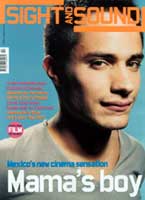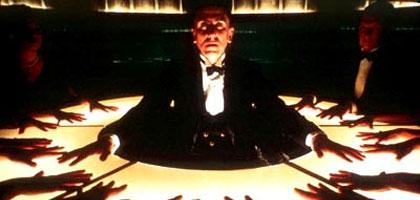
I Yam What I Yam
Film of the Month: Invincible

Werner Herzog's long-awaited new fiction film has his trademark dreams and awkward hero. So what's missing, asks Richard Falcon
Invincible is Werner Herzog's first fiction feature since his now disowned mountaineering melodrama Scream of Stone (Shrei aus Stein) in 1991. The documentary/fiction distinction, though, is always muddy with Herzog. His television and film documentaries (which have dealt, in the past ten years or so, with credulity-straining survival tales, near-apocalyptic disasters and grand rituals of faith and pilgrimage) have continued to gaze with dumbfounded awe at a world beyond either fiction or rational and generic documentation.
My Best Fiend (Mein liebster Feind), the director's 1999 film about his relationship with Klaus Kinski, was both a stocktaking and an acute addition to he Herzog mythology. Its critical success, together with the dubious honour bestowed on Herzog explicitly by Harmony Korine and implicitly by Lars von Trier as the absent father of Dogme, weighs Invincible down with expectations. Perhaps this is why the film - the story of a young Jewish blacksmith Zishe Breitbart who leaves his East Polish village in 1932 to become a music-hall strongman in a Weimar Berlin on the verge of Nazi dictatorship, only to return home in a futile attempt to warn his countrymen of the fascist menace - often looks like an attempt to lift the burden of a unique body of work that was always greater than the sum of its parts.
On paper - emphatically not where it counts given the director's celebrated one-liner dubbing film the art of illiterates - Invincible appears hardcore Herzog. The film announces itself - like The Enigma of Kaspar Hauser (Jeder für sich und Gott gegen Alle, 1974) and Heart of Glass (Herz aus Glas, 1976) - as adult folklore and simple fable, here a Jewish tale communicated to Herzog, or so the director claims, by one of Breitbart's descendants. It opens with the hero entertaining his adoring nine-year-old brother Benjamin with a fairytale about a prince and a rooster, which turns on the implacability of identity and destiny and whose moral is best summed up in the words of another cinema strongman as "I yam what I yam."
Breitbart may appear to be at home in what Benjamin describes as the "holy place" of the shtetl, but he has already been set apart by his great strength, in excess of requirements even for a blacksmith. In the 80s German-film scholar Timothy Corrigan located Herzog's identifying motif as "the singular and opaque image of bodily struggle", and Breitbart, the latest exhibit in Herzog's sideshow of holy innocents and prophets doomed to heroic failure, is a body in search of a struggle. In a classic Herzog casting move, Breitbart is played not by a professional actor turned sleek gym rat for the gig, but by Finnish power lifter Jouko Ahola, who at the time of the shoot was reigning champion in the World's Strongest Man competition.
Ahola's genuine physical strength is deployed in an early scene when Breitbart responds to the anti-Semitic taunts of drunken bullies in the village bar with reluctant but punitive violence. The scene is of startlingly generic provenance for a Herzog movie, yet the show of strength on display is nonetheless distinct from the fetishistic, tutored performances of 'musculinity' associated with bodybuilder-turned-actor Arnold Schwarzenegger. With his childlike open features, his acting range cruelly exposed by the longer takes, Ahola is rendered at times almost as awkward as Bruno S. in The Enigma of Kaspar Hauser or Stroszek (1977).
Breitbart is thus made problematic as a repository for audience identification and desire while explicitly fitting the bill as a narcissistic surrogate for Herzog, the director as strenuous athletic visionary. When Breitbart leaves his home to make the journey across the fields to Berlin on foot, the imagery (perhaps unintentionally) invokes Edgar Reitz's masterpiece Heimat but also directly references Herzog's own self-mythologising pilgrimage on foot from Munich to Paris in 1974 to see ailing film critic Lotte Eisner. And as if to underscore the director's customary quixotic self-absorption, variety agent Alfred Landwehr (Gustav Peter Wöhler) finally convinces the strongman to make the trip to Berlin by sitting Breitbart and Benjamin in a cinema, showing them the futuristic marvels of Weimar Berlin via - with upfront comic irony - aerial footage taken from a Zeppelin.
So far, so Herzog-like. But Invincible begins to frustrate the expectations of Herzog fans when Breitbart, having crossed the countryside and outdistanced a kletzmer band that threatens the movie with bathetic Fiddler on the Roof-style philosemitism, reaches the city. More at home with open fields, Herzog establishes Weimar Berlin in anonymous televisual style with a sudden cut to young men in swastika armbands in front of the Brandenburg Gate.
The most arresting image of the early scenes - a 'lizard' being driven around the circus ring by a performer with a whip, which is soon revealed to be a dog in costume (like the rooster pretending to be a prince in Breitbart's fairytale) - seemed to offer up its allegorical meaning more readily than we are used to with Herzog. Now, in Landwehr's office, the impresario clutches his huge cigar and delivers a sheath of exposition complete with highlighted subtext for slower students: Hanussen's Palace of the Occult, where Breitbart will share the bill with the owner, is the celebrated clairvoyant and hypnotist's response to Berliners' deep longings for "a strong man, a leader" born of the insecurity of the times. Breitbart is to offer "a contrasting programme" - setting the strength of the body against the "dark spiritual powers of the occult". Where physical endurance - an article of faith for Herzog - and sporting prowess opened up unimaginable worlds for the real-life ski jumper Walter Steiner in The Great Ecstasy of Woodcarver Steiner (Die grosse Ekstase des Bild Schnitzers Steiner, 1975) and fed Herzog's desire for images adequate to the ineffable, here it serves a conventional thesis about integrity and identity. In order to entertain the increasing number of Nazis in the club, Breitbart has to be 'Aryanised', performing his feats of strength in an operatic Siegfried outfit. Herzog's presentation of the Palace's show again feels televisual - more Joseph Vilsmaier (Marlene) than Cabaret (although at this point we are still reeling from the idea that a Herzog movie has included not just blond Nazis from central casting, but a 30s song-and-dance routine).
It is up to Tim Roth as the historical figure of Erik-Jan Hanussen to salvage the film in its second act. Roth successfully invokes Rudolf Klein-Rogge as Dr Mabuse rather than Paul McKenna when performing his hypnotic act on stage. He also manages the shift from opportunistic exploiter, trying to prostitute his lover Marta (played by world-renowned concert pianist Anna Gourari) to the "ugly crippled dwarf" Goebbels, to fearful victim when his own Jewishness is exposed in the wake of Breitbart's revelation about his own roots. Roth even survives the screenplay's demand that he too spell out the film's sub-Kracauerian theme by explaining to Breitbart that in trafficking in the occult for the purpose of political power (Hanussen momentarily succeeds in his goal of being appointed the head of the Nazi's Ministry of the Occult), they are implicitly taking the road from Caligari to Hitler, "articulating the collective desires... giving the people what they want." Late in the day Herzog treats us to trademark dream sequences in which Benjamin flies and he and Breitbart walk on a beach covered with red crabs.
When back at the shtetl Breitbart becomes a tragic hero, dying two days before Hitler comes to power, his warnings unheeded, it's difficult to be moved or even convinced by Invincible as a film of more than incidental pleasures such as the dream sequences or when Herzog effectively grinds the narrative to let Martha realise her ambition of playing a piano concerto accompanied by a full orchestra. Ultimately Invincible is a film which presses familiar Herzog tropes into the service of a limpid and conventional historical fiction, when really what we demand of the director is to be mesmerised. A film lacking Herzog's USP - an ironic and regressive sense of the irreducible power of images - Invincible feels as though it has been devised by a scholar steeped in Herzog lore, but who at some crucial early stage mistook him for Istvan Szabo.
